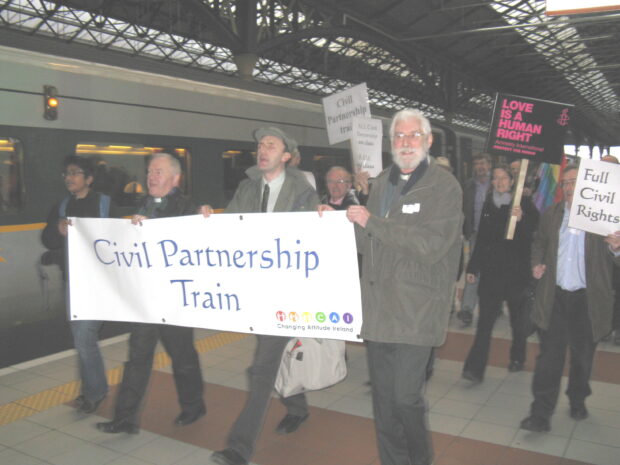The Civil Partnership Train which travelled from Belfast to Dublin on Saturday afternoon (5th December) has boosted calls for Civil Partnership legislation in the Republic of Ireland which would match that already in place in Northern Ireland for the past four years. The Civil Partnership Train is a civil rights initiative inspired by the landmark Belfast to Dublin ‘Contraceptive train’ of 1971 and the historic ‘Peace train’ of 1989. According to Dr Richard O’Leary of the Civil Partnership Train “Since 2005 gay and lesbian couples whose UK Civil Partnership is recognised in Belfast have been decoupled when they arrive at the Irish border town of Dundalk”.
Dr O’Leary added that the current Civil Partnership Bill fails to meet the Irish Government’s own commitment in the Good Friday Agreement to provide in the Republic “at least an equivalent level of protection of human rights as will pertain in Northern Ireland”. Among those travelling on the train from Belfast was Jeff Dudgeon, who brought the famous case against the British Government to the European Court of Human Rights which led to the decriminalization of homosexuality in Northern Ireland in 1982. The train was met at Dublin’s Connolly station by Senator David Norris who brought a similar European Court case against the Irish Government and which led to the decriminalization in the Republic of Ireland in 1993.
Among the passengers on the Civil Partnership Train were pensioners David and Jonathan who said they had previously “come from Dublin to Belfast for the cheaper shopping, and to obtain a UK Civil Partnership”. David described how on crossing the border back into the Republic “people were being robbed of their UK Civil Partnership, which gave a whole new meaning to the term bandit country”. Jonathan described that “he felt like Cinderella after the ball on his return from Belfast to Dublin”. They were also very disappointed to discover that as a same-sex couple they could not use the pensioner Free Travel Pass on the Train, although cohabiting heterosexual pensioner couples are allowed to do so. This follows a decision in 2004 by the then Irish Minister for Social and Family Affairs to bring in new legislation to specifically exclude same-sex couples from Free Travel benefits although they are available to unmarried heterosexual couples. (see http://www.mamanpoulet.com/irish-rail-enforcing-the-ban-on-free-travel-for-same-sex-couples/
Dr O’Leary told reporters that “it is not clear why in the current Civil Partnership Bill some gay and lesbian parents and their children in Dundalk in the Republic of Ireland should have weaker legal recognition compared to those living in Newry, a dozen miles away in Northern Ireland, a situation which will continue unless this Bill is upgraded”. Last month the Taoiseach, Brian Cowen, called for the harmonisation of legislation between the Republic of Ireland and Northern Ireland on the legal alcohol limit for drivers. Yet in the current Bill North-South harmonisation is not being extended to the protection of same-sex couples and their children.
The four point Charter of the Civil Partnership Train also calls for the recognition of widowed same-sex partners who obtained their Civil Partnership overseas or in Britain or Northern Ireland since 2005. Had the Irish singer Stephen Gately died in his native Dublin rather than in Spain, his Civil Partner Andrew Cowles would not have been recognised by the Irish state.
Supporters of the Train included the Church of Ireland pro-gay group Changing Attitude Ireland, the Revd Chris Hudson (ex-Peace Train), Amnesty International (Ireland), the trade union UNITE, Senator Dominic Hannigan who boarded the train at Dundalk and Senator Ivana Bacik who met it on its arrival in Dublin



